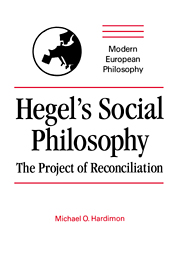Conclusion
Published online by Cambridge University Press: 10 December 2009
Summary
We have, at last, reached the end of our investigation. At this point it is natural to want a comprehensive assessment of Hegel's project of reconciliation. We may want to ask, Does the project succeed? Can we become reconciled to our social world? To ask whether we can become reconciled to our social world is to ask whether the modern social world is a home. One of the things we have learned from Hegel is just how large this last question is. It is much too large to answer fully here. Still, it might be thought that the question concerning the success of Hegel's project is more manageable. Perhaps it is. But to ask whether the project of reconciliation succeeds is to ask whether Hegel's social philosophy as a whole succeeds, and that is a very large question indeed. My aim in this book has been not to provide a comprehensive account of Hegel's social philosophy but, rather, to show that it can be understood as a project of reconciliation. A final assessment of Hegel's social philosophy would be out of place here. Nonetheless, we need to find a way of considering what we have accomplished and where we stand. We need to say something about how we are to view the project of reconciliation.
We would do well to begin by recalling the force and power of the project's guiding question: Can I – or can we – become reconciled to the social world?
- Type
- Chapter
- Information
- Hegel's Social PhilosophyThe Project of Reconciliation, pp. 251 - 258Publisher: Cambridge University PressPrint publication year: 1994

